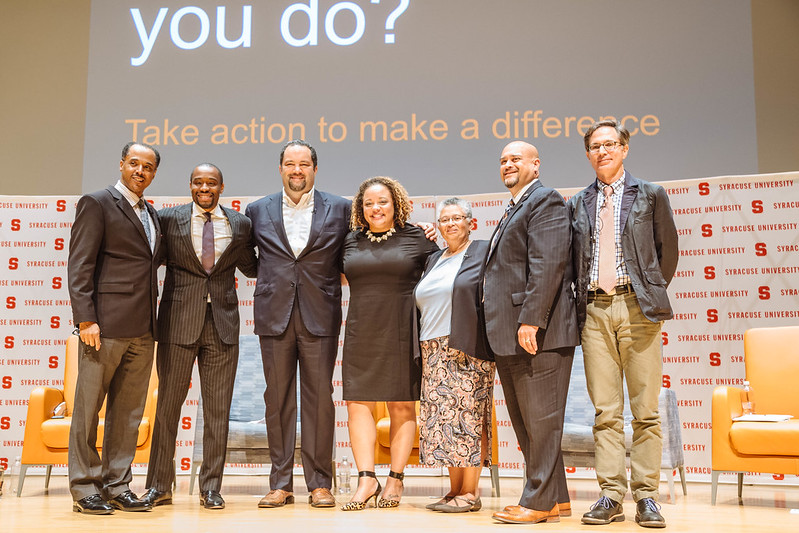Inaugural SU symposium delves into complexities of race relations
September 2, 2016
After reporting on the unrest in Ferguson, Missouri, Marc Lamont Hill was left with a graphic image of teenager Michael Brown’s dead body.
On Aug. 9, 2014, police and authorities abandoned Brown for four and a half fours, Hill said neighbors told him. It was 95 degrees outside, Hill added, and children attempted to protect Brown’s body with a sheet, but it was too short to cover both his feet and head.

Hill shared this shocking anecdote Thursday night during Syracuse University’s Symposium on Race and Our Communities, which students and staff filled Goldstein Auditorium to attend.
An award-winning journalist and author, Hill delivered a message on how to change the discussion on race, justice, violence and policing in the U.S. While Hill spoke on the shooting of Brown, an African-American man, by a Ferguson police officer and the resulting protests, the symposium was a reaction to the recent police brutality in Dallas and Baton Rouge.
Underlying these news stories is an issue with the way officers, especially those in poor suburbs, are policing, Hill explained. Officers linger around African-Americans, waiting for them to do something wrong, he said.
“We live in a world where victims have to be perfect, where victims have to be respectable, where they have to be blameless,” Hill said. While Brown was unarmed, he was not portrayed as a victim because he pushed a store clerk and stole cigarettes, Hill said.
Joining Hill for a panel discussion was Tony Callisto, senior vice president and chief law enforcement officer at SU. Callisto explained that officers should take on the identity of a guardian to a community rather than a warrior. He said warrior attitudes lead to stopping and frisking, which often ends in violence.
Also joining Hill was Benjamin Jealous, a former NAACP president. When Hill discussed how the U.S. relies on the incarceration system to punish people, Jealous cited statistics that show the U.S. imprisons a larger percentage of its black population than South Africa did at the height of apartheid. The incarceration rate for women and Latinos is also climbing, Hill added.
Looking to the death of Sandra Bland, a black woman who was found hanged in a Texas jail cell after being pulled over for a traffic violation in 2015, Hill discussed the role police played. While Bland admitted to being suicidal and depressed, the proper precautions were not taken to ensure her safety, Hill said. He said he believes the prison needs to take some responsibility in her death.
“If she was white, male or had $500, she would not be dead in jail. We live in a country where you have to trade money for freedom, but 84 percent of people in jail don’t have money for bail,” Hill said. “We have to abolish the bail system.”
He urged the audience to try to think of a world without incarceration.
“I’m daring you to imagine a world where justice is not equated with punishment, and where punishment is not equated with confinement,” Hill said.
To make a change, Hill encouraged solidarity among minorities, including women, immigrants and the LGBTQ community. Together, they can fight for not only the end of racism and discrimination, but also other issues plaguing the campus, such as rape, Hill said.
To create changes, Hill told people to resist in ways that make the university feel uncomfortable. He advised students not to protest in the areas that the school provides, but gather in places where they are not welcome.
“Don’t destroy white people, but destroy white privilege. Destroy whiteness as a construct of unmerited power,” Hill said, emphasizing a nonviolent and organized approach.
Students — like Spencer Stultz, a senior studying political science — were moved by Hill’s speech. Stultz described how she felt belittled when she first came to campus three years ago. She saw two options: let herself feel marginalized or listen to herself and people she didn’t understand.
“Black people don’t understand white people, like white people don’t understand black people,” Stultz said. “Listen to what you don’t understand, and listen to what you don’t agree with. If you don’t agree, it’ll make you understand it or it’ll make your argument clearer.”
While asking the panel for help, Tanya David, a public relations and marketing senior, cried out of frustration. A small number of white students attended the event, and David said she felt like they needed to hear the speech the most.
“How can I get people to hear me?” David asked.
Among those showing their support and thanking David for revealing her raw emotions was law school faculty member Suzette M. Meléndez.
“You do have power,” Meléndez told David after the event. “What you did was power. I heard you.”
More by this author
Popular tags on recent stories
By visiting this site, you agree to the Terms of Use
Produced by S.I. Newhouse School of Public Communications,
Syracuse University, 215 University Place, Syracuse, NY 13244







Post new comment